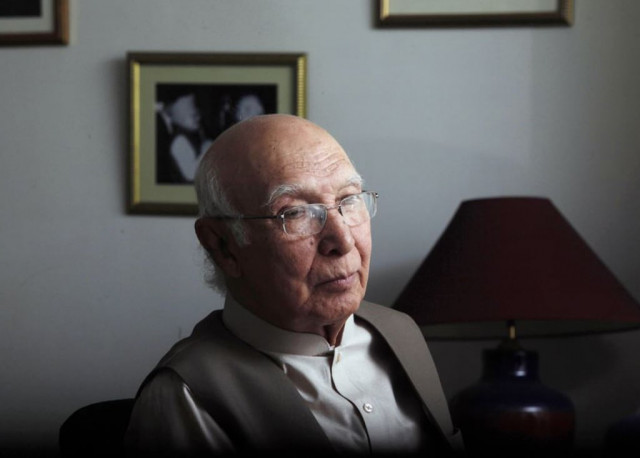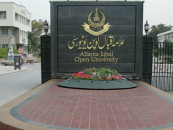Ties with Saudi Arabia, Iran: Envoys to push for a balancing act
Ambassadors’ conference likely to advise govt to maintain neutral posture on Syria.

Prime Minister’s Adviser on National Security and Foreign Affairs Sartaj
Aziz dispelled the impression that Pakistan had changed its foreign policy. PHOTO: REUTERS/FILE
Top Pakistani diplomats posted in Middle Eastern states are expected to recommend a ‘balanced approach’ vis-à-vis ties with Saudi Arabia and Iran, officials said on Sunday.
Ensuring a delicate balance in relations with Tehran and Riyadh is one of the key issues being debated during the three-day envoys’ conference, which kicked off at the Foreign Office on Sunday.
The conference is being attended by Pakistan’s ambassadors to Saudi Arabia, Iran, Qatar, the UAE, Turkey, Egypt, Syria and Yemen.

The conference was inaugurated by Prime Minister’s Adviser on National Security and Foreign Affairs Sartaj Aziz, who underlined the government’s priorities in terms of its foreign policy for the Middle East.
Sources told The Express Tribune that Aziz also talked about the recent developments, including increased cooperation with Saudi Arabia. However, he, according to sources, dispelled the impression that Pakistan had changed its foreign policy.
He told the envoys about the government’s efforts to strike the right balance in its ties with both Saudi Arabia and Iran.
Aziz informed the conference about his recent trip to Tehran where he delivered a letter to Iran’s president on behalf of Prime Minister Nawaz Sharif.
Tehran is believed to have been upset over the warming up of ties between Pakistan and Saudi Arabia in recent months. It feared that increased cooperation between Islamabad and Riyadh could have a negative fallout on the situation in Syria.
Saudi Arabia, which is apparently upset over the United States’ refusal to remove President Bashar al Assad from power through force, is reportedly looking up to Pakistan to help advance its agenda in the key Middle Eastern county.
Insiders disclosed that the envoys are expected to formulate a set of recommendations on how to proceed with foreign policy at a time when the Middle East is passing through a critical phase.
They are also likely to suggest maintaining a ‘neutral posture’ on Syria in a bid to preempt any repercussions for its ties with Saudi Arabia and Iran.
Foreign Office spokesperson Tasnim Aslam said the conference was part of ‘periodic consultations’ with the envoys posted in the Middle East to review the whole gamut of Pakistan’s relations with countries in the region.
She said the conference would hold special consultations on Pakistan’s cooperation with Iran and Turkey.
According to Radio Pakistan, the envoys would also deliberate on avenues to further strengthen Pakistan’s ties with the Middle East, especially in trade, investment and energy sectors.
A large Pakistani community lives in the Gulf states and the conference would discuss measures to facilitate them in light of the government policy of supporting overseas Pakistanis.
Published in The Express Tribune, May 5th, 2014.



















COMMENTS
Comments are moderated and generally will be posted if they are on-topic and not abusive.
For more information, please see our Comments FAQ